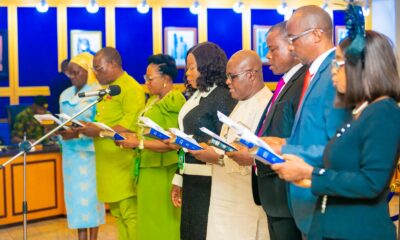Business
Foreign Investors Step Into Nigeria’s Bank Recapitalisation

Governor of the Central Bank of Nigeria (CBN), Mr. Olayemi Cardoso, has disclosed that foreign investors are already moving funds into the country to invest in Nigerian banks under the ongoing recapitalisation exercise.
Cardoso, who stated this at the Afrinvest 2024 Banking Sector Report Launch in Abuja, yesterday, said his team was vigilant and would not allow illicit funds into the Nigerian banking industry or allow bad people to take it over.
Represented by the Acting Director of Financial Policy and Regulations, Mr. John Onoja, Cardoso said the recapitalisation exercise would bolster federal government’s efforts towards achieving the $1 trillion economy goal by 2030.
According to him, “The recapitalisation exercise of the Nigerian banking sector is a pivotal strategy aimed at further strengthening the resilience of the Nigerian banks and promoting sound financial systems in Nigeria.
“Importantly, it will support the government’s goal to achieve a GDP of $1 trillion by 2030. As I listened to the panelists today, we are glad that the capitalisation drive has become a factor that has ignited a lot of activities in all the sectors already.
“The impact of the capitalisation program, we all know, is definitely going to increase the lending capacity of the banks, because liquidity definitely is going to empower them to lend more to the relevant sectors, even like the panelists have indicated to us.
“Definitely, there are going to be increases in foreign investments. We are already seeing them; the foreign direct investments are already coming in. The banks can attest to that.
“Even the foreign exchange liquidity, we can see that a lot of them are through the certificates of capital importation; they are bringing in a lot of forex into the economy, which is going to also affect positively the liquidity situation in the forex market.
“We will rigorously enforce our Fit and Proper Persons criteria for new shareholders, for board members, for senior management, to ensure that there are no illicit funds that will flow into the system, there are no uncleared persons that will take possession of the Nigerian financial institutions, and also to ensure that even the valuation of a bank whose major balance sheets are assured by the Central Bank of Nigeria”.
The Governor said the exercise would positively impact the Gross Domestic Product of the nation, stressing, “It is going to contribute to the GDP growth that we are talking about supporting the present administration.
“Not to talk about better risk management tendencies, improved credit ratings for some of these banks, because of the forex credits they take, the credit ratings are very, very important”.
He added that there would be dilution of shares and ownership for those who are even smaller investors.
“Another opportunity has come for the smaller investors to be able to own shares in the financial institutions, which we know have always been doing very well. The equity market also is already being boosted”, Cardoso said.
He assured that in the event that some of the capital brought in by foreign direct investors could not be taken up, such investors would not suffer any loss, as their funds would be immediately available to them for repatriation.
“We are also conscious of the capitals that are going to be imported into the country especially from foreign direct investors. And we are giving them assurance. We are working on the policy for that, that in the event that they are not able to be taken up, they will not suffer any form of devaluation loss.
“They’ll be able to go back home with their currency at the value that they brought them into the country”, he stated.
Business
NCDMB, Dangote Refinery Unveil JTC On Deepening Local Content

Business
Industry Leaders Defend Local Content, … Rally Behind NCDMB

Business
Replace Nipa Palms With Mangroove In Ogoni, Group Urges FG, HYPREP

-
Business21 hours ago
NCDMB Promises Oil Industry Synergy With Safety Boots Firm
-

 News18 hours ago
News18 hours agoRivers Police Arrest Notorious Cultist, Recover Sophisticated Ammunition
-
Niger Delta20 hours ago
Adopt African System Against Crime, Don Urges Security Agencies
-

 News16 hours ago
News16 hours agoIbas Inaugurates RSIEC, Service Commissions, Healthcare Board In Rivers …Charges Appointees To Embrace Principles Of Service
-
Rivers19 hours ago
Monarch Cautions Youths Against Illicit Drug Consumption
-
Opinion21 hours ago
Why Reduce Cut-Off Mark for C.O.E ?
-

 News18 hours ago
News18 hours agoNIMASA Shuts Two Lagos Terminals Over Security Breach
-
Politics20 hours ago
Alleged Money Laundering: Fayose Has No Case To Answer, Court Tells EFCC

